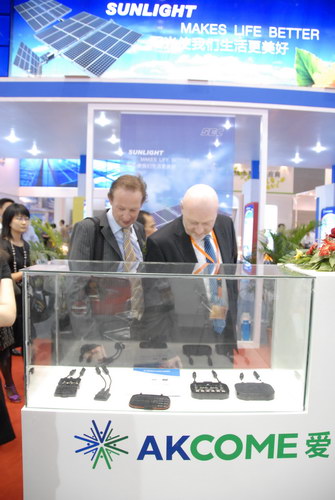Energy
Sino-US clean energy co-op would be 'win-win'
By Tan Yingzi (China Daily)
Updated: 2010-10-08 09:29
 |
Large Medium Small |
WASHINGTON - Clean energy cooperation with China will not result in job losses in the United States, as there is sufficient proof to indicate that around 73 percent of direct jobs created through the development of the energy sector stay on US soil, according to a report released on Oct 6 by the international advisory firm Garten Rothkopf.
 |
|
Foreigners visit the 2010 China New Energy Exhibition in Wuxi, Jiangsu province. [Photo/China Daily] |
The partnership has the potential to not only generate jobs in both nations but also provide a foundation for sustained economic growth and further opportunities, according to the report entitled Anatomy of a Partnership: Benefits of US-China Private Sector Cooperation in the Power Sector.
In a speech at the Woodrow Wilson Center during the release of the report, US Commerce Secretary Gary Locke said he believed clean energy cooperation between China and the US was a win-win effort and that the ties would continue to strengthen. "In no area is that win-win situation more clear than in the energy sector," he said.
"But some have suggested that the race for those jobs (green jobs) is a zero-sum game, saying clean energy technology development in China could be detrimental to the US," he added. "The report indicates the opposite; that the cooperation in clean energy could create hundreds of millions of new jobs in the US and in China."
Locke led a trade delegation of US companies to China in May to promote clean energy ties as part of Washington's efforts to double exports and create two million jobs within five years.
The two major economies account for 42 percent of global energy demand and share similar challenges, such as a growing need for investment in the power infrastructure, the reduction of CO2 emissions and continued dependence on coal-based power generation.
Seven programs on clean energy, which were announced by Chinese President Hu Jintao and US President Barack Obama during their 2009 Beijing summit, have resulted in significant partnership opportunities in many aspects of clean energy development, including research, technology, manufacturing, regulatory policy and low carbon-development strategies.
Yet, there are serious concerns in the US about this cooperation. Many Americans worry that China's growing industrial base for wind and solar power equipment threatens the US' own potential to create new jobs in these sectors.
On Sept 9, the United Steelworkers' union asked the Obama administration to investigate Chinese policies and practices it said threatened to unfairly garner US clean energy jobs.
Earlier, the New York Times reported that aggressive government polices give Chinese wind and solar manufacturers greater advantages and those practices risk breaking international rules.
"The common misconception is that US-China partnerships result in US jobs going overseas," said Jim Rogers, CEO of Duke Energy, one of the largest electric power companies in the US.
"This study demonstrates that for the power sector, new and high paying jobs will be created in both countries - wherever new infrastructure is built, no matter where the technology is developed. We are smart enough to cooperate and compete at the same time."
The report, perhaps the first to assess the job creation consequences and related economic effects of Sino-US collaboration in the energy field, has found significant potential for shared benefits converting coal to gas, carbon capture, solar photovoltaic cell manufacturing and installation, and smart grid development.



